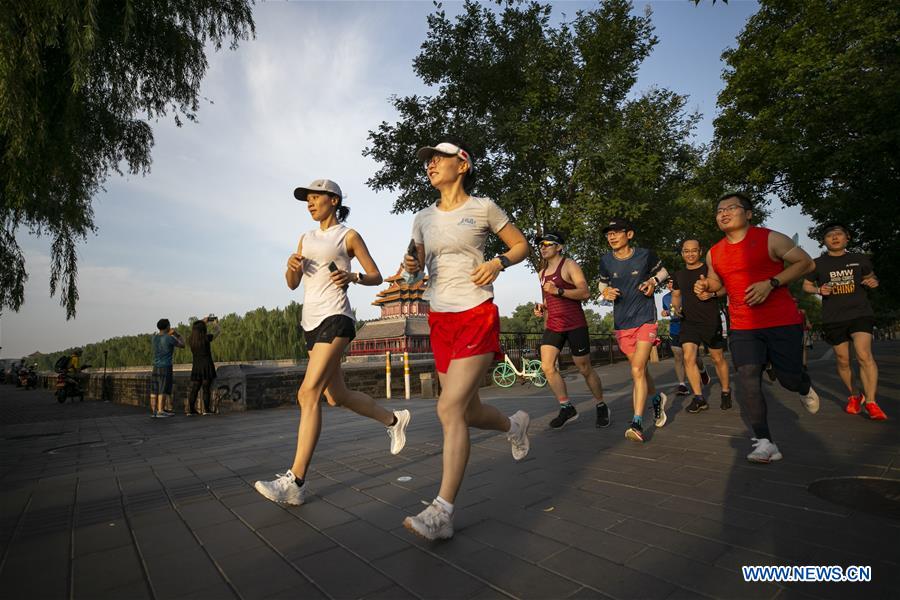“Olympic fever” driving sports consumption in flourishing “Internet+ fitness” industry
Chinese people’s spending on sporting activities is soaring, with a survey finding that about 37.2 percent of those above the age of 7 regularly participate in some form of physical exercise. Statistics indicate that per capita spending on sports by Chinese people increased by more than 30 percent year-on-year in 2020.
The Internet has meanwhile provided a major boost to the ongoing spending boom on fitness. Online platforms enable sporting goods to quickly attract the favorable attention of consumers.

You Jia (1st L), a nurse of Peking Union Medical College Hospital, takes a morning run with running friends near the watch tower of the Forbidden City, in Beijing, capital of China, Aug. 8, 2020. (Xinhua/Li Ming)
Although the Tokyo Olympic Games came to an official end earlier this month, the craze for Olympics-themed products seems to have no end at present in China.
After a little yellow duck hairpin wore by Chinese champion Yang Qian on the Olympic field became a hit, an online store saw its sales of the product begin to skyrocket. “We sold more than 70,000 of these hairpins in three days; while in the past, we could sell only 1 percent of the volume within a period of a whole month,” said the shop owner.
Between July 21 and Aug. 8, sales of sporting goods on the short-video platform Douyin reported a year-on-year growth of 365 percent, with basketball, swimming, badminton, and table tennis products being the top sellers. Furthermore, China’s own homegrown sports brands, including ERKE, Guirenniao, Li Ning and Anta, also attracted a large number of new followers during this period of time.
Statistics indicate that sports clothing, hats and shoes, along with sporting equipment, comprise the main product categories that people will often choose from when making a purchase, while the scale of sports-related services, including physical training, sporting competitions, and stadium bookings, also continued to grow at a fast pace.
Yang Zhiyong, a researcher with the Chinese Academy of Social Sciences (CASS), said that the sporting industry is expected to continue embracing an integrated model of online and offline development, adding that domestic brands will need to stick to innovating their businesses, promoting differentiated development strategies, and always remaining customer-oriented so as to enhance their core competiveness.
Zhang Peili, an associate professor of economics from Renmin University based in Beijing, noted that domestic sports brand have been catering to the needs of customers by always pursuing new innovations, improving the quality of their products, and enhancing their products’ added value. In addition to offering higher quality sporting goods, another big virtue of domestic sports brands is that they are more cost-effective compared with global brands.
Other major drivers behind the vigorous growth in sports consumption include favorable supporting policies and people’s soaring enthusiasm for sporting activities, according to Ma Dehao, an associate professor of sports and health from Shanghai’s East China Normal University.
According to an extensive five-year mass fitness program that will span the period from 2021 to 2025, the general public is expected to benefit from more convenient physical fitness outlays by 2025, achieving the full coverage of fitness facilities in counties, towns, and administrative villages and communities that provides access within a 15-minute walk. Moreover, the sporting industry is expected to continue expanding to reach a total value of 5 trillion yuan accordingly.
The circular for the program also pointed out that sports-related enterprises will be encouraged to pursue digitalization so as to nurture new products and new business models. This will further satisfy customers’ needs for sporting goods and services, and provide a more flexible means to match up the supply side with the demand side.
A campaign promoted under the framework of the program has been carried out across the country. According to the campaign, people are being encouraged to open up their own physical fitness accounts in order to keep better track of their own personal fitness activities. After taking part in physical exercise, they can deposit the tokens they earn into their personal account and at a later date they may choose to exchange the deposited tokens for sporting goods or use them to enjoy a variety of services ranging from purchasing movie tickets to ordering car-hailing services.
The program, which is seen as a pilot to integrate online and offline fitness scenarios, has been implemented in various localities. Furthermore, starting this year, Beijing and Shanghai along with Guangdong, Jiangsu, Hebei, and Shandong provinces have issued consumption vouchers to their citizens with an aim to promoting expanding participation in mass physical fitness.
Photos
Related Stories
Copyright © 2021 People's Daily Online. All Rights Reserved.










